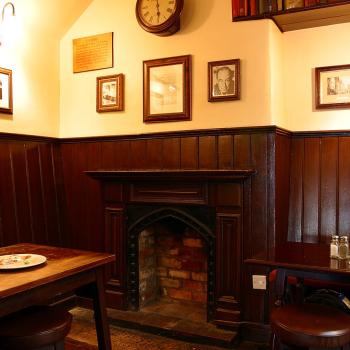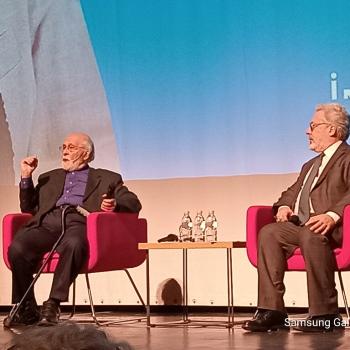The sad case surrounding baby Charlie Gard has led the Vatican to issue a statement in defense of the medical community. While it is understandable how and why parents might not want to admit the facts surrounding their baby, doctors, who are much better trained and know what is and is not possible, need to be heeded so that baby Charlie does not end up suffering needlessly due to the unjust expectations and desires of his parents.
Sadly, so many do not understand the issues at hand, and believe that Catholic teaching suggests we must hold on to earthly life to the bitter end, using any and every means possible to do so, natural or unnatural. This is not, and has never been, the case.[1] Life is a good, but temporal existence is not meant to be prolonged beyond reasonable measure. We are not to seek death, nor should we excuse the unjust death of others. On the other hand, we should not seek an unnatural prolonging of life in the world. A person should not be forced to live a life as an undead person, a life of perpetual death, where they face the forces of death always present with them while the good which is provided by death is never attained. Death can bring us out of the pain and suffering of the world, and so it is not something to be absolutely feared; rather, like St Paul, we should always accept that death is indeed going to come for us and when it does, it does not need to be seen as a loss: “For to me to live is Christ, and to die is gain” (1 Philp. 1:21 RSV). Thus, we are to find that with our faith in Christ, we do not die in vain, we do not die without hope. In our death, we hope to find our rest in and with Christ, knowing that we can be received by him and resurrected to true and eternal life in and with him. “But we would not have you ignorant, brethren, concerning those who are asleep, that you may not grieve as others do who have no hope” (1 Thes. 4:13 RSV). Death, then, can be a good, not because we were created for the sake of death as our final end, but rather, because we were meant for eternal life and death is the passage which we now have to face to get there. Death is what is able to bring us out of the calamities of temporal existence with all the hardship it brings, once we have truly come to the time when our life should be at an end. “The righteous man perishes, and no one lays it to heart; devout men are taken away, while no one understands. For the righteous man is taken away from calamity, he enters into peace; they rest in their beds who walk in their uprightness” (Isa. 57:1-2 RSV).
Knowing this, we know we should not idolize temporal existence, thinking it was what we were always meant for and so should be preserved at all costs. Even if there had been no sin, temporal existence would have only been the beginning of our journey; we were always meant to go beyond it, into eternal life. God became man so that man can become God: the goal God had in store for us was communion with him and participation in his eternal life. The incarnation takes that normative goal and adds to it all that we need in order to attain it because of the harm that sin has caused us in our lives. If we ignored this transcendent goal, and thought that the life, the immortality, which was meant for us was merely prolonged temporal existence, it is easy to see how this will make us try to continue on with that goal, prolong and stretch out our earthly life, and in doing so, cause ourselves great harm, for we will have the same life-force in us, but now being used and stretched out longer and so quite thin in the process.
This, then, should explain why we must not do anything and everything possible to sustain earthly life when it can no longer continue, and death is at hand. If we take someone who is dying, and find a way to keep their life force stuck in their mortal coil, for however long this last, they will find themselves in a living death, which will be full of suffering without any of the good of life itself. This is why there cannot be any expectation or requirement to unnaturally prolong their earthly existence: it is fine to let them experience the peace found in death. This is not a rejection of life, but the realization that their life has already come to an end; their time has come, and all that is being done is preventing the last elements of life from going forth its natural way with them, causing them to live in and of the world in a ghastly state, not truly alive, not truly free. Forcing them to go on in such a state is not pro-life, but rather, pro-death, because it brings the powers of death into the temporal real, incarnating them, and making people face it in perpetuity until at last, they are let go and free to die. As long as they remain in such a state, the suffering of life, but not the joys, continue on with them; who could be so cruel as to force them to live that way, if that is all that they will ever have? It is not natural, it is not good; it can even be said to be torturous and therefore sinful to force them to persist in such a state without allowing them to experience the good of death itself.
![Doctor Who Cyberman by Jordanhill School D&T Dept (Dr. Who Exhibition at the Kelvingrove) [CC BY 2.0 (http://creativecommons.org/licenses/by/2.0)], via Wikimedia Commons](https://wp-media.patheos.com/blogs/sites/637/2017/07/Dr._Who_Exhibition_at_the_Kelvingrove_4006198632-258x300.jpg)
![Nazgul by Danijel on DeviantArt [CC BY-SA 3.0 (http://creativecommons.org/licenses/by-sa/3.0)], via Wikimedia Commons](https://wp-media.patheos.com/blogs/sites/637/2017/07/Nazgul_fan_art_-_Danijel_-_cropped-210x300.jpg)
‘In Eregion long ago many Elven-rings were made, magic rings as you call them, and they were, of course, of various kinds: some more potent and some less. The lesser rings were only essays in the craft before it was full-grown, and to the Elven-smiths they were but trifles — yet still to my mind dangerous for mortals. But the Great Rings, the Rings of Power, they were perilous.
‘A mortal, Frodo, who keeps one of the Great Rings, does not die, but he does not grow or obtain more life, he merely continues, until at last every minute is a weariness. And if he often uses the Ring to make himself invisible, he fades: he becomes in the end invisible permanently, and walks in the twilight under the eye of the dark power that rules the Rings. Yes, sooner or later — later, if he is strong or well-meaning to begin with, but neither strength nor good purpose will last — sooner or later the dark power will devour him.’
‘How terrifying!’ said Frodo.[2]
Thus, Tolkien and Doctor Who both express the horror which must be rejected, a horror made possible by those who misunderstand what life is and what death is, and who will fight the end of temporal existence by any and all means. Likewise, both demonstrate what becomes of such a person: they become, as it were, an undead force seeking to convert others to be like them, an evil wraith incapable of free thought as they find their activity all works for the prolonging of their worthless existence.
Certainly, this is not to deny the good of the medical profession, nor the good which is had by those whose life has been preserved through the hands of a good doctor. Medicine is good so long as it brings about healing, so that it improves the quality and not just the quantity of life. Neither the good of life, when it remains, nor the good of death, are to be rejected – each have been given to us as gifts. Sadly, so many get confused, and either embrace ghoulish existence as life, and force such undead existence upon others, never allowing them rest, or others see no value in life, and are quick to kill of those who truly could thrive again. We must act with prudence, not ideology; nihilism became a problem as hope was drained from the world, but we must remember, its inversion is also an ideology which must be rejected, for it too knows no hope, no hope for the dead. Christians, having rejected the temptation of nihilism, have now found themselves tempted by its inversion; let us never fall for it. “A good name is better than precious ointment; and the day of death, than the day of birth. It is better to go to the house of mourning than to go to the house of feasting; for this is the end of all men, and the living will lay it to heart” (Eccl. 7:1-2 RSV).
[1] The Vatican, therefore, has made it clear that basic, normative care is to be expected, but extraordinary care which hurts the patient and is of no benefit to them is not. Thus, we read in commentary to the CDF’s Responses to Certain Questions of the United States Conference of Catholic Bishops Concerning Artificial Nutrition and Hydration, “On the other hand, this duty in general includes only the use of those means which, considering all the circumstances, are ordinary, that is to say, which do not impose an extraordinary burden on the patient or on others.” Disproportionate means are not expected. Ron Hamel, PHD, Director of the Catholic Health Association in St Louis explained that this meant, among other things, extreme physical discomfort could create the situation in which even normative means are impossible and cannot be forced, but this has to be determined in a case by case basis with actual proof of the harm being done. In the situation with Charlie Gard, this is exactly what the medical community has done.
[2] J.R.R. Tolkien, The Fellowship of the Ring in The Lord of the Rings: Collector’s Edition (Boston: Houghton Mifflin, 1966), 56.
Stay in touch! Like A Little Bit of Nothing on Facebook:
A Little Bit of Nothing













